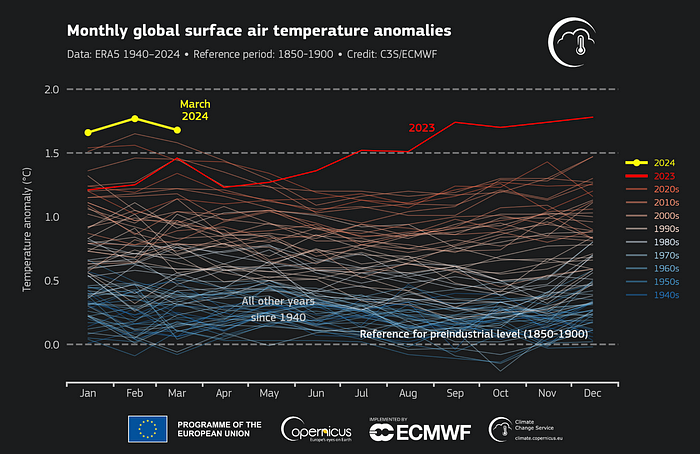
Earth Day. Yesterday, today, and tomorrow, a global security matter.
This week began by celebrating the fifty-third World Earth Day when the same urgency emerges from every corner of our planet- coral reefs to glaciers, forests to deserts- time is up. In other words, we have said far too many, and now all we have left is to act and react. At this critical, unprecedented time, this anniversary is not and cannot be just an anniversary, a carousel on social media, or an event; it must be a reminder that calls us to think deeply about the need to take concrete action.

In the last fifty-three years, we have made progress and witnessed essential changes in global climate policies, but not yet radical ones, and it is clear that more is needed. Day by Day, it is becoming increasingly clear that the wounds inflicted on our planet over time are causing devastating consequences. And the scars, if left untreated, can prove fatal. The news released by Copernicus that March 2024 is the tenth warmest consecutive month on record is just one of the countless warning signs we cannot ignore. But this is the point: we can no longer “just” talk. If fifty-three years ago, this Day represented a cry for awareness, today it must turn into an engine for action. Today, awareness alone is no longer enough. As much as being aware of a problem is undoubtedly the first step toward solving it, however, by itself, awareness is not the solution. Only through concrete and measurable actions can we change the course of events and try to safeguard the future of our planet.
A rallying cry and concrete initiatives are essential in a world where climate warning signs are the order of the Day. By founding the Future Food Institute 10 years ago, I wanted to give our factual response to the signs of suffering on our planet, starting with food and water, our basic needs. Food is life and nourishment; it is a vehicle of values, culture, and identity; food is sociality. The great challenge of our era is to preserve the planet, healthily nourish humans, and take care of the ecosystem that hosts it. Humanity will only be able to adapt to the significant changes we are experiencing by re-learning to understand the value of food and to reconnect with food, those who produce, distribute, process, and share it. Eating is essential for human life, but it requires consciousness and awareness. We have done this with the many innovation projects in our living labs, especially by training tens of thousands of people to become climate shapers. Finally, the world is beginning to understand that everything is connected. Food security and climate change are interconnected. I believe my recent appointment to the Commission on Food Security in Geneva, “Food Security: Re-imagining Global Governance” by the Kofi Annan Foundation, supported by the Rockefeller Foundation, fully represents this realization.
Together with the other members of the Commission — Elhadj As Sy, president of the Kofi Annan Foundation and former secretary-general of the International Federation of Red Cross and Red Crescent Societies (IFRC); Amir Abdulla, former deputy executive director of the World Food Program (WFP) and former UN coordinator for the Black Sea Grains Initiative; H.E. Hailemariam Dessalegn Boshe, former executive prime minister of Ethiopia and former deputy prime minister and minister of foreign affairs; Dr. Agnes Kalibata, president of the Alliance for a Green Revolution in Africa (AGRA); Dr. David Nabarro, former co-head of the UN Global Crisis Response Group on Food-Energy-Finance and strategic director of the 4SD Foundation; Dr. Soumya Swaminathan, president of the M S Swaminathan Research Foundation (MSSRF) and former chief scientist of the World Health Organization (WHO); and Mariana Vasconcelos, co-founder and CEO of Agrosmart — we will work to develop policy recommendations based on scientific evidence, breaking silos, studying some cases that have been able to generate a concrete impact measured over the years, involving stakeholders who until now have not been empowered and therefore have never even been considered part of the possible solution, to create together a new system of global governance of food security, and consequently the security of the planet.
Earth Day is a powerful reminder of our collective responsibility to the planet. Now more than ever, it is essential to recognize that every daily choice and every action for sustainability contributes significantly to the health of the Earth and all humanity. Talking about it will continue to raise awareness and push us to become active players in building the future. Celebrating this Day unites us with the mantra:
“Eat Well, Stay Well, Save the Planet!”
reminding us that our planet’s health is essential to humanity’s health.
The Future Food Institute is an international social enterprise and the cornerstone of the Future Food Ecosystem, a collection of research labs, partnerships, initiatives, platforms, networks, entrepreneurial projects, and academic programs that aim to build a more equitable world through enlightening a world-class breed of innovators, boosting entrepreneurial potential, and improving agri-food expertise and tradition.
Future food advocates for positive change through initiatives in Waste & Circular Systems, Water Safety & Security, Climate, Earth Regeneration, Mediterranean Foodscape, Nutrition for All, Humana Communitas, and Cities of the Future as we catalyze progress toward achieving the Sustainable Development Goals (SDGs).
Learn more at www.futurefoodinsitute.org, and join the conversation on Facebook, Instagram, Twitter, LinkedIn, or YouTube. Or attend a program through the FutureFood.Academy!

